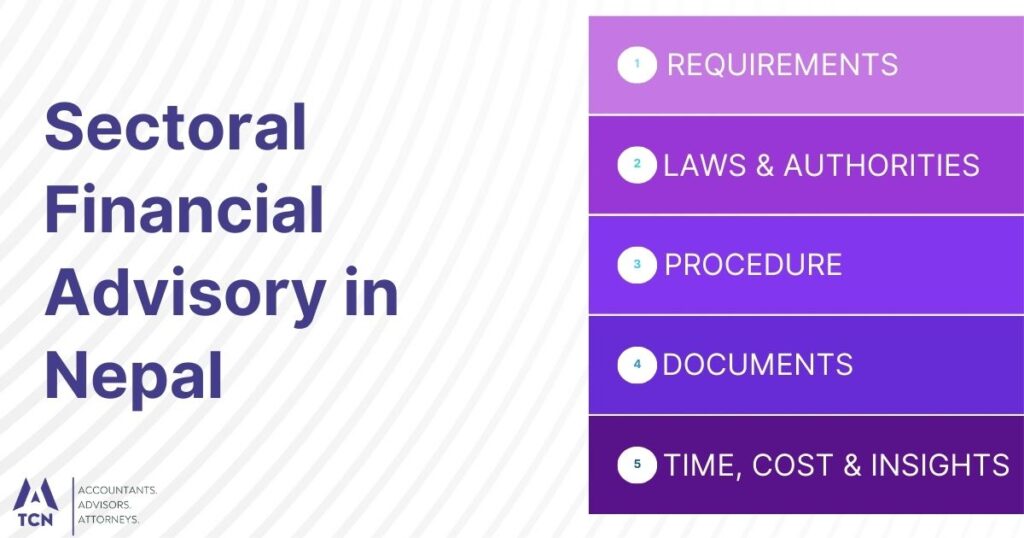Sectoral financial advisory refers to specialized financial guidance and consultation services tailored to specific industries or economic sectors in Nepal. This type of advisory focuses on providing in-depth insights, analysis, and recommendations for businesses operating within particular sectors such as agriculture, manufacturing, tourism, or information technology. Sectoral financial advisors possess extensive knowledge of industry-specific trends, challenges, and opportunities, enabling them to offer targeted advice on financial strategies, investment decisions, and risk management.
How does sectoral advisory work in Nepal?
In Nepal, sectoral advisory services operate through a combination of data analysis, market research, and expert consultation. Financial advisors specializing in specific sectors gather and analyze industry-specific data, including market trends, economic indicators, and regulatory changes. They then use this information to provide tailored recommendations to businesses within that sector. The process typically involves:
- Initial consultation to understand the client’s business and objectives
- Comprehensive analysis of the sector’s current state and future prospects
- Identification of sector-specific risks and opportunities
- Development of customized financial strategies and recommendations
- Ongoing monitoring and adjustment of advice based on sector developments
Why is sectoral advisory important for businesses?
Sectoral advisory holds significant value for businesses in Nepal due to its targeted approach. It provides:
- Industry-specific insights that general financial advice may overlook
- Better understanding of sector-specific risks and opportunities
- More accurate financial forecasting based on sector trends
- Tailored strategies for growth and competitiveness within the sector
- Improved decision-making through sector-specific benchmarking
- Enhanced ability to navigate sector-specific regulatory requirements
What information is needed for sectoral advisory?
Effective sectoral advisory requires a wide range of information, including:
- Company financial statements and performance data
- Industry-specific market research and trend analysis
- Regulatory framework and policy environment of the sector
- Competitive landscape within the sector
- Economic indicators relevant to the sector
- Technological advancements impacting the industry
- Global trends and their potential impact on the local sector
Who provides sectoral financial advisory in Nepal?
In Nepal, sectoral financial advisory services are provided by various entities:
- Specialized financial advisory firms
- Management consulting companies with sector-specific expertise
- Investment banks with dedicated sector research teams
- Professional services firms (e.g., accounting and audit firms)
- Industry associations offering advisory services to members
- Government agencies providing sector-specific guidance
What’s considered good sectoral advisory in Nepal?
Good sectoral advisory in Nepal is characterized by:
- In-depth understanding of the specific sector and its dynamics
- Up-to-date knowledge of local and global industry trends
- Ability to provide actionable recommendations
- Clear communication of complex financial concepts
- Consideration of Nepal’s unique economic and regulatory environment
- Ethical practices and adherence to professional standards
- Proven track record of successful advisory in the sector
How often should businesses seek sectoral advice?
The frequency of seeking sectoral advice depends on various factors:
- Size and complexity of the business
- Rate of change within the sector
- Regulatory environment and its volatility
- Business lifecycle stage
- Specific financial challenges or opportunities
Generally, businesses should seek sectoral advice:
- Annually for strategic planning and budgeting
- Quarterly for performance reviews and adjustments
- During major business decisions or sector shifts
- When facing sector-specific challenges or opportunities
Are there legal requirements for financial advisors?
In Nepal, financial advisors must comply with certain legal requirements:
- Registration with the Securities Board of Nepal (SEBON) for investment advisors
- Compliance with the Securities Act, 2063 (2007) and related regulations
- Adherence to the Nepal Rastra Bank’s guidelines for financial institutions providing advisory services
- Professional certifications as required by regulatory bodies
Which authorities regulate financial advisory in Nepal?
Financial advisory services in Nepal are regulated by:
- Securities Board of Nepal (SEBON)
- Nepal Rastra Bank (NRB)
- Office of the Company Registrar
- Ministry of Finance
- Institute of Chartered Accountants of Nepal (ICAN)
How does sectoral advisory differ from general advisory?
Sectoral advisory differs from general advisory in several ways:
- Focuses on specific industry dynamics rather than broad financial principles
- Provides deeper insights into sector-specific risks and opportunities
- Offers more accurate benchmarking against industry peers
- Considers sector-specific regulatory and compliance issues
- Provides more targeted growth strategies aligned with sector trends
Can sectoral advisory guarantee business success?
While sectoral advisory provides valuable insights and recommendations, it cannot guarantee business success. Factors influencing success include:
- Management’s ability to implement advice effectively
- Unforeseen market changes or economic shocks
- Company’s financial resources and operational capabilities
- Competitive pressures within the sector
- External factors beyond the control of the business or advisor
What are the limitations of sectoral advisory?
Sectoral advisory in Nepal faces certain limitations:
- Dependency on the quality and availability of sector-specific data
- Potential for bias based on the advisor’s experience or perspective
- May not fully account for unique aspects of individual businesses
- Limited ability to predict unforeseen sector disruptions
- Challenges in adapting global sector trends to Nepal’s context
How does Nepal’s advisory services compare globally?
Nepal’s sectoral advisory services are evolving but face challenges compared to global standards:
- Limited availability of specialized advisors for certain sectors
- Less developed market research and data analytics capabilities
- Fewer resources for continuous professional development
- Challenges in accessing global industry insights and best practices
- Limited integration of advanced technologies in advisory services
However, Nepal’s advisory services benefit from:
- Strong understanding of local market dynamics
- Ability to provide culturally relevant advice
- Growing emphasis on professional standards and regulations
What factors influence sectoral trends in Nepal?
Several factors influence sectoral trends in Nepal:
- Government policies and economic reforms
- Global market conditions and trade relationships
- Technological advancements and digital transformation
- Changes in consumer behavior and preferences
- Infrastructure development and accessibility
- Availability of skilled workforce
- Foreign direct investment and international collaborations
- Natural resources and environmental factors
How can businesses use sectoral advisory effectively?
To use sectoral advisory effectively, businesses in Nepal should:
- Clearly define their objectives and expectations from the advisory
- Choose advisors with proven expertise in their specific sector
- Provide comprehensive and accurate information about their business
- Actively engage in the advisory process and ask questions
- Critically evaluate advice in the context of their unique situation
- Implement recommendations systematically and monitor results
- Maintain ongoing communication with advisors for updates and adjustments
Additional FAQs:
Is sectoral advisory relevant for all industries?
Sectoral advisory is relevant for all industries, but its importance may vary. Industries experiencing rapid change, high competition, or complex regulations often benefit more from specialized advice.
Capital Raising Strategies in Nepal
Business Valuation Process in Nepal
Budgeting and Forecasting in Nepal
How does economic policy affect sectoral advisory?
Economic policies significantly impact sectoral advisory by influencing:
- Investment climate and business opportunities
- Regulatory environment and compliance requirements
- Fiscal and monetary conditions affecting sector growth
- Trade policies impacting sector competitiveness
- Sector-specific incentives or restrictions
What does a negative sectoral outlook indicate?
A negative sectoral outlook suggests:
- Potential challenges or risks facing the industry
- Possible decline in sector performance or profitability
- Need for businesses to adapt strategies or seek new opportunities
- Increased importance of effective financial management and risk mitigation
How can businesses choose the right advisor?
To choose the right advisor, businesses should:
- Verify the advisor’s credentials and sector-specific experience
- Check references and past performance in similar advisory roles
- Assess the advisor’s understanding of Nepal’s business environment
- Ensure alignment of the advisor’s approach with business needs
- Consider the advisor’s access to relevant data and research resources
Does company size impact advisory needs?
Company size impacts advisory needs in several ways:
- Larger companies may require more complex and comprehensive advisory
- Smaller businesses might need more basic guidance and support
- Mid-sized companies often seek advice on scaling and market expansion
- Advisory needs evolve as companies grow and face new challenges
How does sectoral advisory relate to strategic planning?
Sectoral advisory plays a key role in strategic planning by:
- Providing industry-specific insights for informed decision-making
- Identifying sector trends and opportunities for long-term growth
- Assessing competitive positioning within the sector
- Evaluating potential risks and challenges specific to the industry
- Aligning financial strategies with sector-specific business objectives
Get in Touch with Us
Our team consists of Chartered Accountants, Corporate Lawyers and Chartered Financial Analysts. Our Firm is renowned for provide expert legal, tax and financial services. Contact us for Quick Legal and Tax Consultation.
📧 Email: info@taxconsultantnepal.com
📞 Phone: +977 9840993599
📍 Location: Sinamangal Marga, Old Baneshwor, Kathmandu, Nepal
You can contact us via email, contact form, or phone call. We are also available on WhatsApp, Viber, Telegram, and WeChat for your convenience. Feel free to drop your queries, and our professionals will get back to you promptly.


